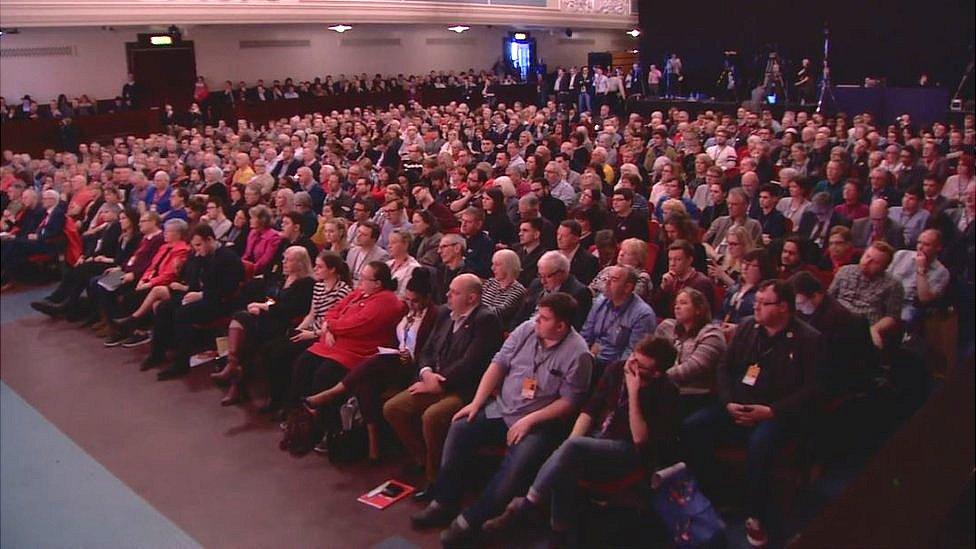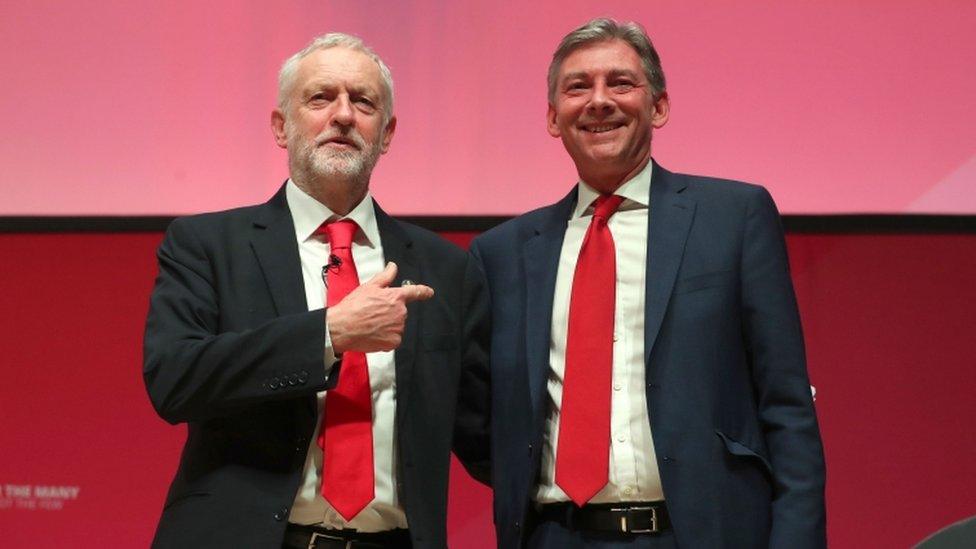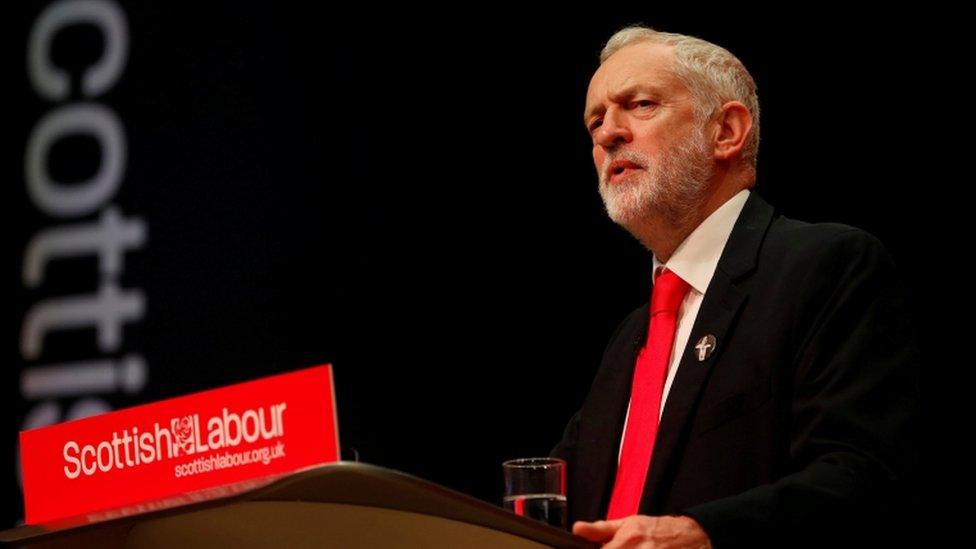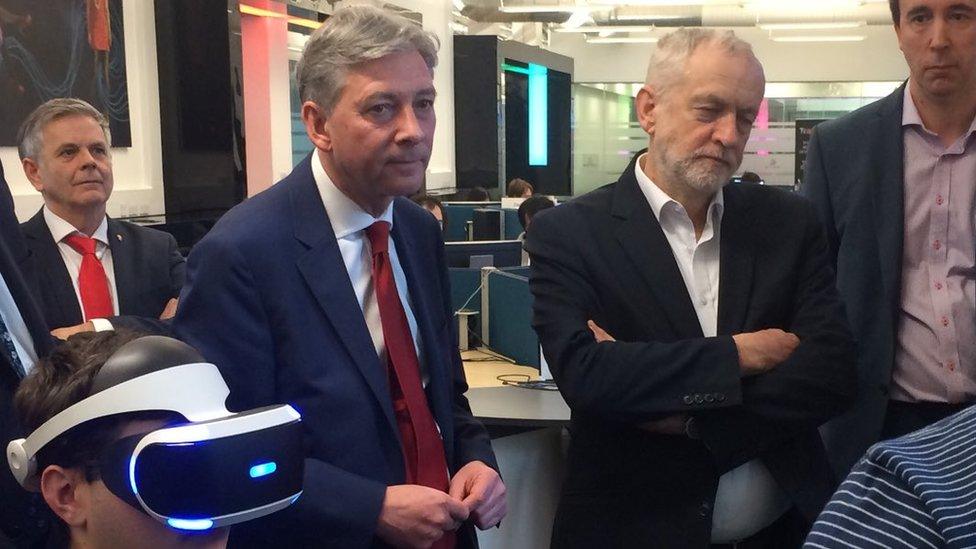Richard Leonard wants to 'fundamentally change' economy
- Published
Richard Leonard says he is angry with the "callousness of the Tories and the complacency of the SNP"
Richard Leonard has used his Scottish Labour conference speech to underline his "mission" to "fundamentally change" the economic system.
The party leader told delegates in Dundee that "our economy needs less market and more planning".
Mr Leonard also proposed reforms to the rental sector and positioned himself against private financing schemes.
UK leader Jeremy Corbyn addressed the conference on Friday, with John McDonnell to close it on Sunday.
Mr Leonard's speech was his first as Scottish Labour leader, after he took on the job from Kezia Dugdale in November 2017. He paid tribute to Ms Dugdale's leadership and "energy in the most turbulent of political times".
He also announced that the party will be tabling a "Mary Barbour law" at Holyrood to reform the private rented sector and help solve Scotland's "housing crisis".
'Less market, more planning'
The MSP told party members that he was "absolutely determined" to bring about change in the labour market and the economy, saying he was "angry about the callousness of the Tories and the complacency of the SNP".
He said: "Our economy needs less market and more planning, less short-termism and more long-term sustainable development.
"The Scottish Parliament's primary purpose should always have been the economic transformation of Scotland. Tackling the underlying weaknesses of the Scottish economy - not least the massive growth in overseas ownership of our industry which is now a third of our economy.
"Given Brexit, there must be a redoubled, and renewed, sense of urgency - a new determination that we begin this economic transformation now."
He added: "Our party's mission under my leadership is not simply to secure a fairer distribution of wealth from the existing economic system, it is to fundamentally change the existing economic system."

Richard Leonard - a proud man of the left
Analysis by BBC Scotland political reporter Philip Sim

Scottish Labour members gathered in Dundee to hear Richard Leonard's conference speech
You would not have known this was Richard Leonard's first conference speech as party leader.
Yes, he looked palpably nervous when he first appeared on stage, and stumbled over the odd line. But he got the crowd going in a way that Jeremy Corbyn really didn't on the previous day.
He cracked some jokes which went down well with the (admittedly friendly) crowd, and pulled out some old lefty classics to get them purring - actually quoting Karl Marx at one point.
Indeed, the whole speech was about Mr Leonard positioning Labour firmly to the left, setting out his stall as leader of a "radical" and unashamedly socialist party.
Bye bye PFI, hello public ownership and a planned economy. Red meat for the red-clad conference crowd, yes, but a piece of political positioning that could have much longer-lasting impact.
Regardless of the simmering row over Brexit and the single market, this is very much Richard Leonard's party now.

The proposed "Mary Barbour law", named after the "Red Clydeside" political activist who played a leading role in the rent strikes of 1915, is to be lodged at Holyrood as a member's bill.
It would introduce;
a new points-based system to enforce fair rents
link the level of rents to average wages to ensure they are affordable
give tenants the power to challenge unfair rents
and impose "proper standards" for health and safety and energy efficiency on private rented properties.
Mr Leonard also positioned his party firmly against private financing of public infrastructure, saying they would go into the next Holyrood election under his leadership "committed to signing no new private finance deals".
He said old PFI schemes and the non-profit distribution (NPD) and Hubco schemes used by the current government were not providing "value for money" and were "raking off millions in profits".
And he said Labour should "set out before the people of Scotland the biggest programme of social and economic reform in the history of the Scottish Parliament", claiming that if the party is "true to our radical roots" then "nothing and no-one can stop us".

Jeremy Corbyn addressed the conference on Friday
UK party leader Jeremy Corbyn launched the conference on Friday by saying Labour was "preparing to go into government" at Holyrood and Westminster.
He also underlined his policy of seeking "a customs union" with the EU post-Brexit, and made references to immigrant workers which led Mr Murray to comment that "the only person smiling after that passage of Jeremy's speech would have been Nigel Farage".
Mr Leonard later dismissed that comparison as "wrong and unfair".
He told the BBC's Sunday Politics Scotland programme: "People have got very strong views about what they would like the future shape of both Scotland and the UK's relationship with the European Union to look like after Brexit.
"But I just think it is wrong to equate anything that Jeremy Corbyn has said with Nigel Farage.
"The truth of the matter is Jeremy Corbyn, throughout his entire life, is one of the most active anti-racist campaigners I have known.
"He is someone who has stood up, all his life, for workers' rights. He is someone who represents one the most multi-cultural constituencies with a large amount of immigration in it of any in the whole of the UK."
'Positive immigration case'
The event closed at noon on Sunday after a debate on Brexit and a speech from Shadow Chancellor John McDonnell.
There has been controversy over the Brexit debate after the party executive put down a policy motion which members would have to vote down before they could vote on pro-single market proposals put forward by local party groups.
Former leader Kezia Dugdale told a fringe event on Saturday afternoon that Labour should be "at peace with making the positive case for immigration" and single market membership.
This was echoed by Edinburgh MP Ian Murray, who said MPs could ultimately unite to push the UK towards single market membership post-Brexit - but added that the "biggest impediment is the Labour front bench".
- Published9 March 2018

- Published9 March 2018
